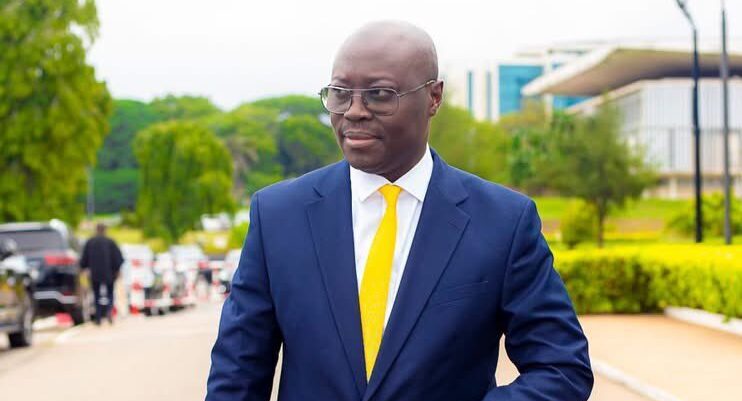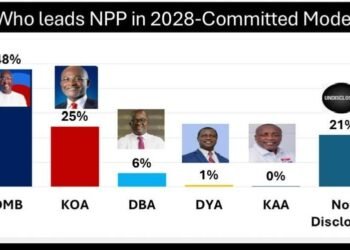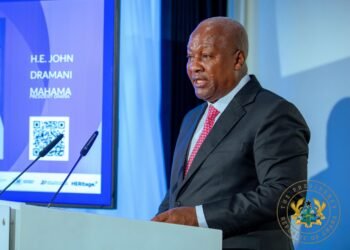Finance Minister Dr. Cassiel Ato Forson has received widespread commendation for what is being described as a marked departure from the symbolic and controversial leadership of his predecessor, Ken Ofori-Atta.
Deputy CEO of the Forestry Commission, Elikem Kotoko, is among the latest to applaud the minister’s approach, citing his “professionalism,” practical economic interventions, and ability to communicate clear fiscal direction to Ghanaians.
Delivering his remarks in the aftermath of the 2025 Mid-Year Budget Review on Thursday, July 24, Mr. Kotoko said Dr. Forson’s performance was “the first time in over a decade” that the country had seen “a professional display of what is expected of a Finance Minister.”
“It gives me some sense of relief that for once, we have a Finance Minister who is serious and is taking Ghanaians seriously”
Elikem Kotoko, Deputy CEO of the Forestry Commission
However, Mr. Kotoko’s comments were not limited to praise of Ghana’s current Finance Minister.

He also delivered a scathing critique of former Finance Minister Ken Ofori-Atta, whose tenure he accused of being riddled with superficial presentations and “religious symbolism” that detracted from the pressing economic issues.
“He was clad in white and giving us Bible quotations; the accompanying Bible verses were a complete toast and total variation with the personality involved at the time, who has now been declared a fugitive”
Elikem Kotoko, Deputy CEO of the Forestry Commission
NIB Recapitalisation and Cedi Stability
Among the key highlights of the 2025 Mid-Year Budget Review was the government’s successful recapitalisation of the National Investment Bank (NIB), a development which Dr. Forson said was critical to job preservation and confidence restoration in the banking sector.
According to the Finance Minister, the Mahama administration has implemented an “ambitious and credible plan” that includes a GHS 450 million capital injection, GHS 1.5 billion in re-marketable bonds, and the transfer of GHS 500 million worth of government shares in Nestlé Ghana Limited to the bank.
These measures have had a measurable impact. “The NIB’s capital adequacy ratio, which stood at -51.13% in December 2024, improved to 23% by May 2025.” This turnaround has reportedly preserved more than 900 jobs.

In addition to banking reforms, Mr. Kotoko praised the recent stability of the Ghanaian cedi, attributing the development to coordinated policy actions by key economic stakeholders, including the Bank of Ghana and the Ministry of Finance.
He specifically highlighted the role of strategic programmes such as Gold for Oil and Gold for Reserves. “There is very significant evidence that we are heading in the right direction, with inflation dropping,” Kotoko remarked.
With the cedi currently trading at approximately GHS 10.43 to the US dollar, a significant improvement from its volatile performance in 2022 and 2023, Kotoko believes that if inflation drops to single digits, the country could be looking at even more substantial relief from its debt burden.
“I am convinced that we would be heading to over GHS 250 billion written off – not by us paying, but by the strength and potency of our currency”
Elikem Kotoko, Deputy CEO of the Forestry Commission
Fiscal Culture Shift
Elikem Kotoko further pointed out that Dr. Forson used the mid-year budget presentation to also outline new measures aimed at curbing revenue leakages, particularly at Ghana’s customs entry points.

A key reform involves the introduction of Artificial Intelligence (AI) to reduce human interference in revenue collection.
According to the Deputy CEO of the Forestry Commission, the use of AI is expected to enhance transparency, improve efficiency, and help eliminate long-standing corrupt practices in the revenue sector.
These systems are part of a broader digital governance transformation aimed at optimising state revenue without overburdening the taxpayer.
His endorsement of the Finance Minister reflects a growing sentiment that the Ministry of Finance under Dr. Forson is restoring both credibility and results-based governance.
Kotoko emphasised that for the first time in recent memory, fiscal leadership is not about optics or rhetorical flair but about delivering measurable economic progress.
His remarks underline a broader confidence in the Finance Ministry’s direction under President John Dramani Mahama, especially at a time when fiscal stability remains crucial to Ghana’s economic recovery.
READ MORE: T-Bills Auction Oversubscribed by 264% After Budget Review























